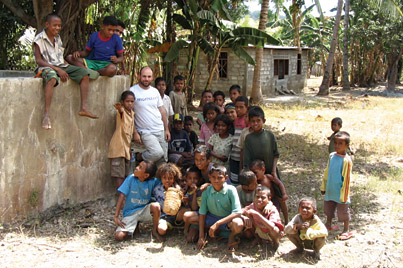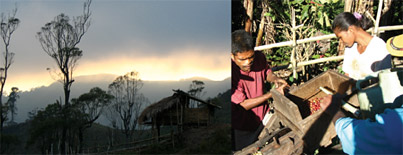Traveling (Page 2)

James with Timorese children in Sananain, East Timor.
Western culture has seeped into most corners of the world and can make it hard to see how people really live or to understand the true character of a country. We had no desire to eat at McDonald's, hear Britney Spears on the radio or discuss the outcome of Survivor. We were aiming to be travelers. And we are by no means putting down tourists - it's just we believe we should visit distant lands of contaminated water and malaria while we have strong immune systems and a tolerance for chaos. But would we survive without the comforts of home? How would we know when we were outside the bubble? What strategies would we employ to integrate into local cultures? This trip is still a work in progress, but here are some things we have learned so far:
Understand Local Geography and Politics
A little knowledge about the local culture, history and geography can distinguish the traveler from the tourist. While browsing in a second-hand bookstore in Melbourne, Australia, we started chatting with the shop owner. Recognizing our accents, the shopkeeper declared how knowledgeable Canadians were about the world compared to our American cousins. She said the Americans she had met could not even name the Australian states, the founding prime minister or the national anthem. We smiled, said our farewells, and promptly memorized all eight states and territories, the founding prime minister (Sir Edmund Barton) and the name of the national anthem (Advance Australia Fair). We didn't want to give Canada a bad name, so we vowed never again to get caught in any country without a little knowledge.
Always Put Your Hook in the Water
One lesson we learn over and over is not to be afraid to try something new. Our favourite example is a sailing trip we took outside of Hobart, Tasmania, in a place called Possum's Bay, where Tara tried fishing for the first time. Although we consider ourselves outdoorsy types, being veteran canoe trippers, neither of us have much interest in hunting or fishing. Tara was not overly enthusiastic about fishing, but at the urging of our skipper, Simon Firth, she baited her hook and dropped it in the water. In a matter of minutes, to everyone's amazement, she reeled in a five-foot-long shark. Simon was so pleased with the catch that he invited us back to his home to share a dinner of shark fillets and good red Australian wine with his wife, his brother and his 90-year-old mother. We never imagined that a bit of fishing would yield a prize like the hospitality Simon and his family showed us that day.
Join an International Travel Organization
In researching our trip, we heard about a United Nations-affiliated travel organization called SERVAS (www.servas.org). Its objective, "to encourage peace through travel," is accomplished by a program of short-term home-stays around the world. Joining is easy and open to people of all ages and backgrounds. Accommodations and food are provided free; an important factor when traveling on a tight budget. The added benefit is that hosts offer insights and information that can't be found in the guidebooks. We have stayed with two hosts so far, who went out of their way to make us comfortable in their homes.
Arie, a retired house painter, immigrated to Australia from the Netherlands. He put us up in his tiny one-bedroom apartment outside of Sydney, in a town called Paramatta. While it was cramped on his fold-out living room couch, he cooked us a delicious traditional Dutch breakfast (butter and chocolate sprinkles spread on a flaky Dutch wafer) and answered all our questions about traveling the world. Our hosts in Darwin, John and Margaret, a couple in their mid-50s, put us up in their luxurious condo that overlooked Darwin's most prestigious neighbourhood and marina. Although SERVAS specifies that a two-night stay is the norm, they were happy to feed and shelter us for five nights, take us on picnics in local parks, and show us their favourite places in the city. Through our SERVAS hosts, we were able to see parts of Australia that most tourists would miss.
Throw Away the Guidebook
After Australia we moved on to East Timor, which had achieved independence in 2002 after 24 years of brutal occupation by Indonesia. We had been warned against traveling in a country that is barely stable, but we wanted to see for ourselves how the Timorese people were recovering from such a traumatic history. Although Tara and I had studied international development at McGill and I served as a peacekeeper in Bosnia, neither of us were completely prepared for what we found. The capital of Dili was home to burned-out buildings, a destroyed infrastructure and people simply trying to survive day to day. We were moved and humbled by the sense of humour and inner strength of the people we met. After years of struggle and oppression the Timorese were not hardened, but were the warmest and kindest people we had encountered.
Plug in Locally
While our hotel in Dili provided refuge from the chaos outside the front door, we decided a better approach to understanding the culture would be to do volunteer work. We began networking with the UN and a few other development organizations. Within a week, we were working with USC Canada. (I think it helped our chances that Sandy Bristow, the Country Director for USC, was a McGill alumnus.) The USC office employed 18 Timorese, who took us to local restaurants and hang-outs and to their hometowns. Luck struck again when Sandy asked us to spend a week with fieldworkers to see first-hand the work USC was undertaking. In the tiny villages of Kalohan, Sananain and Usu'un we lived with families, ate meals cooked over an open fire, and talked for hours (through an interpreter) with the people about their lives during the Indonesian occupation. We even learned some of the Timorese language from the local children. USC staff showed the villagers how to grow a range of vegetables, build water systems and use simple hand mills to improve their coffee crops. We were amazed to learn how little support was required to better the lives of so many people.
Conclusion
Our challenge to see the world on a budget continues. We are not yet missing the comforts of home (unless you count having a toilet with a seat on it), but we expect that to change as we spend more time on the road. The travel gods have brought us hot and sunny weather since we reached Southeast Asia, a relief after a week of Tasmanian winter. Most important, our Canadian dollars seem to be stretching just far enough. Eating only two meals a day and walking everywhere have been good ways to save money. It has been harder to save on accommodation costs - except it is cheaper to sleep in dorm rooms than private rooms. This has been a tolerable option, although we are tired of being a married couple that sleeps in bunk beds.
In this multidisciplinary degree in international studies, as this trip has surely become, we'll have no final exams. We do have regular assignments - find food and shelter, make friends and develop a new appreciation for the world - and we learn new lessons every day about ourselves and those around us. Stay tuned.

A Timorese toilet suspended above a pigpen. Villagers in Kalohan, East Timor, use a hand mill donated by USC Canada to process coffee.


